

Free to teach creationism? When the free schools programme was first proposed in 2008 by the then shadow education secretary Michael Gove, it was Sweden that he held up as his inspiration.
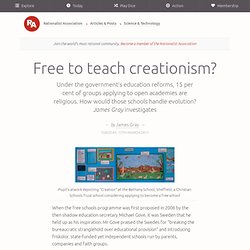
Mr Gove praised the Swedes for “breaking the bureaucratic stranglehold over educational provision” and introducing friskolor, state-funded yet independent schools run by parents, companies and faith groups. For Mr Gove, the apparent success of Sweden’s 900 friskolor demonstrated that the state monopoly over English schools needed to be broken. “What has worked in Sweden can work here,” he said. The Conservatives went into the 2010 general election with a pledge to set up “Swedish-style free schools” and shortly after the coalition was formed the Academies Act, the enabling legislation for free schools, was passed. Power.pdf. Cultural Bias in Teaching. Cultural bias in teaching can be described as teachers and administrators holding the belief that the dominant or mainstream (presumably European and North American) cultural ways of learning and knowing are superior to ways of learning and knowing that do not reflect such a culture.
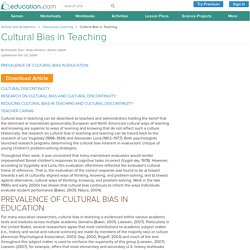
Historically, the research on cultural bias in teaching and learning can be traced back to the research of Lev Vygotsky (1896–1934) and Alexander Luria (1902–1977). From Degrading to De-Grading. March 1999.
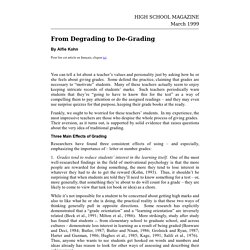
Using Standards and Assessments:Why Standardized Tests Don't Measure Educational Quality. W.
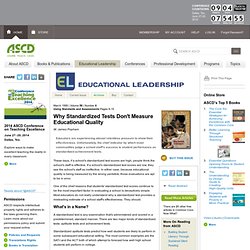
James Popham A standardized test is any examination that's administered and scored in a predetermined, standard manner. There are two major kinds of standardized tests: aptitude tests and achievement tests. Standardized aptitude tests predict how well students are likely to perform in some subsequent educational setting. The most common examples are the SAT-I and the ACT both of which attempt to forecast how well high school students will perform in college. But standardized achievement-test scores are what citizens and school board members rely on when they evaluate a school's effectiveness. A Standardized Test's Assessment Mission The folks who create standardized achievement tests are terrifically talented. Such relative inferences about a student's status with respect to the mastery of knowledge and/or skills in a particular subject area can be quite informative to parents and educators.
200 Free Online Certificate Courses & MOOCs from Great Universities. MOOC's Take a Major Step Toward College Credit - Technology. By Jeffrey R.
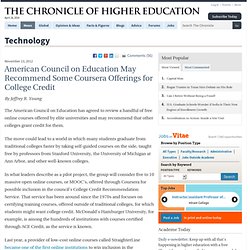
Young The American Council on Education has agreed to review a handful of free online courses offered by elite universities and may recommend that other colleges grant credit for them. The move could lead to a world in which many students graduate from traditional colleges faster by taking self-guided courses on the side, taught free by professors from Stanford University, the University of Michigan at Ann Arbor, and other well-known colleges. In what leaders describe as a pilot project, the group will consider five to 10 massive open online courses, or MOOC's, offered through Coursera for possible inclusion in the council's College Credit Recommendation Service. That service has been around since the 1970s and focuses on certifying training courses, offered outside of traditional colleges, for which students might want college credit.
Cooper Union. Coordinates: The Cooper Union for the Advancement of Science and Art, commonly referred to simply as Cooper Union or Cooper Institute,[4] is a privately funded college located in Cooper Square in the East Village neighborhood of Manhattan, New York City.
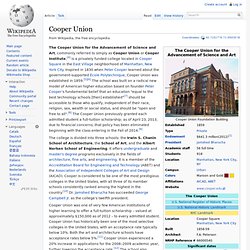
Inspired in 1830 when Peter Cooper learned about the government-supported École Polytechnique, Cooper Union was established in 1859.[5][6] The school was built on a radical new model of American higher education based on founder Peter Cooper's fundamental belief that an education "equal to the best technology schools [then] established"[7] should be accessible to those who qualify, independent of their race, religion, sex, wealth or social status, and should be "open and free to all".[8] The Cooper Union previously granted each admitted student a full-tuition scholarship; as of April 23, 2013, due to financial concerns, that policy has been eliminated beginning with the class entering in the Fall of 2014.[9] The Foundation Building[edit]
Return of the Renaissance Man - SpaceCollective-alternate. Posted at SpaceCollective.org by Rene If there is one thing I have enjoyed about SpaceCollectivesince its inception, it is the polymath nature of most of this site’s forward thinkers.
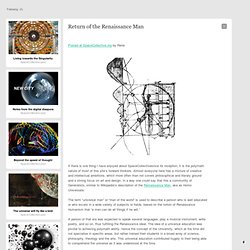
Marketable Skills: State of Game Programming Education - Jeff On Games. My good friend and educator Bill Crosbie is asking some tough questions on Twitter, specifically about what to teach fledgling game programmers to make them the most marketable to game companies when they graduate.
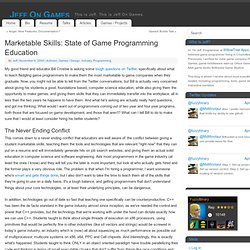
Now, you might not be able to tell from the Twitter conversations, but Bill is actually very concerned about giving his students a good, foundations based, computer science education, while also giving them the opportunity to make games, and giving them skills that they can immediately transfer into the workplace, all in less than the two years he happens to have them. And what he's asking are actually really hard questions, and got me thinking: What would I want out of programmers coming out of two year and four year programs, both those that are focused on game development, and those that aren't?